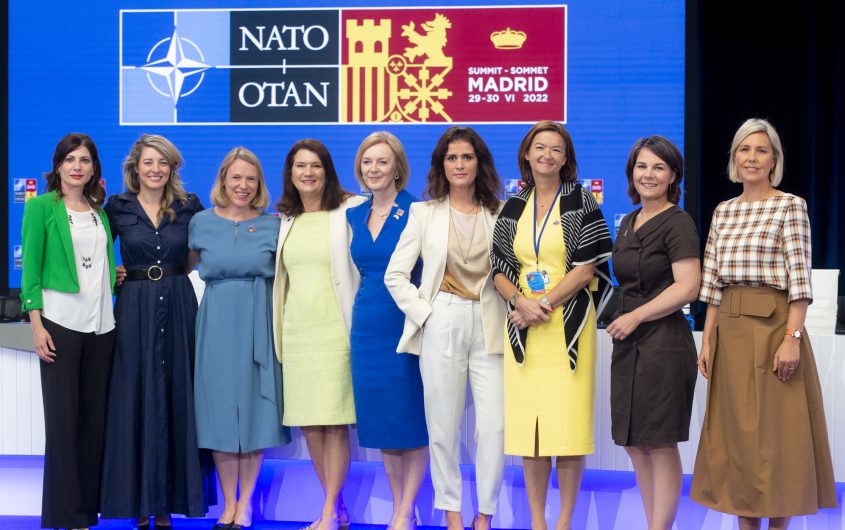
via NATO
One Year in: How Is Germany’s Feminist Foreign Policy Doing?

Barbara Mittelhammer
Independent political analyst & consultant
Barbara Mittelhammer is an independent Berlin-based political analyst and consultant. Her research focuses on feminist foreign policy, gender in peace and security, human security, and the role of civil society in foreign policymaking. She has published on applying feminist foreign policy, i.a. toward Iran and Syria, and has worked with think tanks, foundations, international organizations, ministries, parliamentarian,s and civil society organizations, including Carnegie Europe, Heinrich-Böll Foundation, Friedrich-Ebert Foundation, European Parliament, the German Foreign Office, or GIZ. In addition, she is a trained mediator. Prior to her independent activities, she was working with a political consultancy and the Munich Security Conference. Barbara Mittelhammer studied political science, international law, and cultural anthropology in Munich and Paris.
A year ago, the German foreign ministry launched “Shaping Feminist Foreign Policy,” guidelines committing to a feminist foreign policy by strengthening the rights, resources, and representation of women and girls as well as diversity worldwide. The self-imposed goal is to develop a “feminist reflex” in foreign policy action. But while a reflex is per definition an immediate, automatic action that cannot be altered nor affected from the outside, German foreign policy does not seem to be there yet. In the first year, the German Foreign Office has embraced the opportunity to become more diverse and gender equal in internal processes and programming. But overall feminist policies do not seem to be the order.
What is (German) feminist foreign policy?
As much as there are different political, activist, or academic perceptions of what a feminist approach to foreign policy might entail, all of them essentially recognize inequalities as drivers for conflict and insecurity. Feminist foreign policy recognizes that not all people worldwide have equal access to power, opportunities, and resources—and aims to change this. Feminist approaches thus emphasize equal participation of women and groups traditionally marginalized in (foreign) policymaking and critically reflect on power relations.
Spelling out their understanding of feminist foreign policy, the German Foreign Office describes their approach as one of principled pragmatism. It centers around rights, resources, and representation, the so-called 3-R framework, and emphasizes diversity in processes and structures, including through engaging marginalized voices and civil society actors in foreign policymaking. To translate that into political action, the ministry has set up ten guidelines across all spheres of foreign policy, ranging from peace and security to humanitarian assistance; cultural diplomacy to climate and energy, international trade, and economic policies; and the ministry’s internal workings. Instruments foreseen for implementation include mainstreaming the approach, attracting and working with multipliers worldwide, establishing gender budgeting, and monitoring progress and challenges. But especially the latter remains vague.
Assessing the performance ratio of the “feminist reflex”
The document offers few measurable goals, little operationalization, and does not include a pre-defined process for monitoring, evaluation, or eventual re-adjustment. Still, it is worth assessing how much the guidelines’ overall ambitions have been put into practice.
Operational: Toward cultural change without (much) structure backing it up
Notably, four out of the ten guidelines address internal aspects of strengthening gender equality, diversity, and inclusion in the Foreign Office and service. With gender and diversity ratios in staffing, there is a clear yardstick for progress. Even if the overall percentage of women in leadership positions in the Foreign Office remains below the federal average (43 percent), the ministry increased it by 5 percentage points to 35 percent over the last year. With the launch of the guidelines, the Foreign Office also introduced some structural changes, such as a Special Envoy (in the same capacity as the Director for Human Rights) and a desk for feminist foreign policy. However, their resources and public visibility remain limited.
The guidelines’ emphasis lies on cultural change by including, protecting, and strengthening women and marginalized groups, as well as training gender and diversity competencies at all levels of foreign ministry and foreign service staff. While assessing their impact after only a year might be presumptuous, efforts are clearly visible. And given the current political climate in Germany—as much as throughout all of Europe—planting a feminist seed in a way not easily reversible by a next and possibly different government seems like a smart choice.
Programmatic: More gender aware, more diverse—more mainstream?
At the programmatic level, gender budgeting is the most prominent instrument outlined in the guidelines, with the goal to spend 85 percent on gender-sensitive and 8 percent on gender-transformative projects for all project funding. When it comes to humanitarian assistance, 100 percent is to be spent at least in a gender-sensitive way. New strategies such as those on humanitarian assistance or crisis engagement are still titled “gender” and not “feminist” strategies. But they refer to the concept and its commitments in their essence, for example by strengthening the role of intersectional needs assessments in crises and humanitarian aid contexts.
However, ensuring accountability is part of the game. Reporting schemes differ widely, and there is no clear and comprehensive framework for reporting under the feminist guidelines as of now. It will be relevant how the Foreign Office follows through on these concrete and measurable steps—and how public accountability to commitments will be ensured.
Policy: But are policies feminist?
At the policy level, a feminist approach remains opaque – at best. Admittedly, the European and global contexts appear less than favorable for a feminist course, with challenges ranging from anti-feminist movements in EU member states from Hungary to Italy or a global order increasingly falling back to militarized approaches. But in essence, feminist foreign policy starts with doing things differently at home. Yet neither mainstreaming feminist approaches nor integrating those perspectives in regional and topical portfolios are evident, at least for the time being. Individual activities and initiatives in the Foreign Office and embassies still depend a lot on personal commitment by individuals, and feminist mainstreaming seems to be faltering.
Admittedly, the potential impact of Germany’s feminist foreign policy is also limited by the fact that only the Federal Foreign Office and the Ministry for Economic Cooperation and Development have committed to the approach. There is, thus, no coherent feminist policy across the government, which becomes evident when assessing the stark contrast between the ambitions of the 3-R approach and Germany’s climate or migration policy, to name but two examples. The German government, as a whole, would be well-advised to reconsider. The gap between proclamation and reality comes with increasing criticism from international partners—be it states or civil society. Germany’s stance on the war in Gaza is the most recent and starkest example.
A long walk toward the “feminist reflex”
While questions and criticism after the first year remain, Germany’s foreign policy is on its way to becoming more gender aware and inclusive. And more substantially, the commitment to feminist foreign policy opens up the space to discuss reservations. Now, two things are needed to facilitate the guidelines implementation: First, these discussions should not only be had in feminist communities but the Foreign Office needs to truly integrate those perspectives into all areas of foreign policy—as committed to in the guidelines. And second, political attention in listening to those voices as well as political will in following through is critical.








